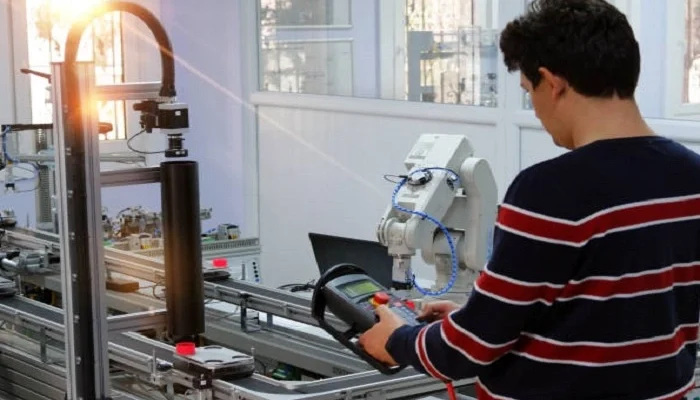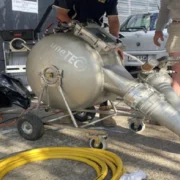Today’s industrial landscape is being redefined by automation, digitalisation, and intelligent systems. As factories, plants, and facilities integrate smart electrical equipment and digital control systems, the skills required of the workforce are rapidly evolving.
One of the most effective ways to bridge this gap is through structured, practical automation training for industrial professionals. To remain competitive and efficient, organisations must ensure their teams can confidently work with programmable logic controllers (PLCs), human-machine interfaces (HMIs), robotics, and advanced sensors.
The Growing Demand for Automation Skills
The International Society of Automation (ISA) reports that the demand for skilled automation technicians is growing steadily due to ongoing digital transformation across manufacturing and utilities. The global shift toward Industry 4.0 has intensified the need for workers trained in real-time data management, control systems, and intelligent device operation.
This shift is not limited to large enterprises. Small and medium enterprises (SMEs) are also adopting automation to increase output, reduce manual errors, and remain cost-effective. As a result, hands-on automation training for technical teams has become a priority across sectors.
What Effective Automation Training Looks Like
High-impact automation training goes beyond theory. It combines classroom sessions with practical exposure to real-world industrial systems. Trainees interact with actual electrical instruments and programmable devices, including human-machine interfaces (HMIs), sensors, and motor control units.
An effective programme should:
- Provide practical sessions with programmable controllers and simulation software
- Teach how to deploy and troubleshoot electrical devices and systems
- Include modules on system integration, data monitoring, and diagnostics
- Offer exposure to networked automation environments and cybersecurity fundamentals
- Equip personnel to employ automation in daily operations with minimal supervision
Incorporating real industrial scenarios into training boosts retention and empowers staff to manage automation systems independently.
Role of HMIs in Automation Training
Human Machine Interfaces (HMIs) are a critical component of any modern automation system. They enable operators to visualise, control, and manage industrial processes in real time. During automation training, HMIs are used to demonstrate how real-time data is collected from various electrical instruments and processed for decision-making.
Training that includes HMI configuration and operation enables team members to respond to alarms, adjust system parameters, and monitor production flows with greater accuracy. Understanding how to interpret HMI dashboards and incorporate that data into troubleshooting or optimisation strategies is a fundamental part of becoming automation-ready.
How Upskilled Teams Drive Efficiency and Reliability
A well-trained workforce brings significant value to an organisation. By deploying technicians with current automation knowledge, companies can:
- Minimise downtime through accurate diagnosis and faster resolution
- Improve productivity by streamlining manual tasks
- Reduce dependency on third-party service providers
- Lower operational risks by ensuring safe and compliant use of electrical equipment
- Maximise the life cycle of instruments and systems through correct usage
Organisations that invest in upskilling report increased staff productivity and better ROI from automation investments.
Overcoming Skill Gaps and Legacy System Challenges
Many industries still operate with a blend of legacy systems and modern automation components. Employees often face challenges in integrating or maintaining new equipment without formal training. Automation training for industrial environments addresses these challenges by bridging knowledge gaps and ensuring compatibility across systems.
Moreover, electrical instruments and devices are increasingly interconnected. Understanding how these systems interact and how data flows across platforms allows teams to deploy automation projects more confidently and safely.
Why Practical Training Beats Theoretical Learning
While online modules and theoretical content provide foundational knowledge, hands-on training enables learners to directly engage with the tools and systems they will use in the field. It helps them:
- Build confidence in configuring equipment and interfaces
- Understand failure points and common troubleshooting techniques
- Employ safety protocols specific to automation devices
- Experience real-time operation of control systems and sensors
The tactile experience of working with actual industrial components is what transforms knowledge into capability.
The Role of Reputed Electrical Brands in Training
Partnering with a reputed electrical brand can greatly enhance the effectiveness of an automation training programme. Trusted brands bring in-depth knowledge of current technologies, safety standards, and best practices. They can design customised training modules using actual industrial-grade devices and provide insights drawn from extensive field experience.
These collaborations often offer access to the latest tools, such as state-of-the-art HMIs, simulation labs, and software platforms. Working with a reliable partner also ensures that the training aligns with evolving industry standards and regulatory requirements.
Empower Your Workforce with Future-Ready Skills
In a world where industrial success depends heavily on smart, connected, and autonomous systems, upskilling is not optional; it is essential. Automation training for industrial professionals not only improves system performance but also transforms teams into strategic contributors to business growth.
With the right training strategy and the support of a reputable electrical partner, companies can build a workforce that is prepared to lead in the age of industrial automation, efficient, empowered, and ready to innovate.
Pedrovazpaulo Executive Coaching: Unlocking Potential with Its Power









Comments